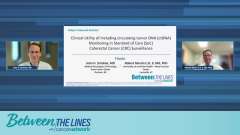
The Importance of Multidisciplinary Communication and Care Coordination for the Resected CRC Patient
Experts discuss the critical role of clear pathology communication and risk assessment after colorectal cancer surgery, highlighting how surgical quality, pathologic staging, and timely ctDNA testing guide personalized adjuvant therapy decisions and coordinated long-term surveillance to optimize patient outcomes.
Episodes in this series

In the postoperative period following colorectal cancer surgery, effective communication of pathology results and risk assessment for recurrence are critical components of patient care. The quality of surgery is emphasized, particularly the importance of clear proximal, distal, and radial margins and adequate lymph node harvest, ideally exceeding 12 nodes, to ensure an oncologic resection. Pathologic staging remains foundational in guiding prognosis and surveillance strategies, with circulating tumor DNA (ctDNA) testing emerging as an important adjunct. Timing of ctDNA testing is crucial, typically performed four 4 to six 6 weeks after surgery to minimize false positives. This test offers insight into minimal residual disease, allowing clinicians to better stratify patients based on their risk of recurrence.
The role of ctDNA in clinical decision-making has grown significantly. A positive ctDNA result indicates a high risk of recurrence and usually prompts recommendations for adjuvant chemotherapy, whereas a negative result in patients with stage 2 patients disease often supports surveillance without immediate chemotherapy. Challenges arise when ctDNA results and pathologic staging do not align, requiring personalized discussions that consider patient preferences and potential outcomes. Despite variability in ctDNA assay platforms, tumor-informed tests have demonstrated strong predictive value, sometimes identifying recurrence months before imaging or biomarker changes. This early detection capability has improved the overall quality of care and has been considered practice-changing in colorectal cancer management.
Long-term surveillance after surgery requires a coordinated handoff from surgical teams to medical oncology for ongoing monitoring, especially with ctDNA and carcinoembryonic antigen (CEA) testing. While Although surgeons often conclude their involvement within six 6 months, ongoing surveillance is vital for early recurrence detection and salvage therapy. Medical oncologists or oncology specialists, rather than primary care providers, are best suited to manage this complex follow-up, ensuring patients receive timely testing and interpretation. Close communication between among providers is essential to maintain high standards of care and optimize outcomes for colorectal cancer survivors.
Newsletter
Stay up to date on recent advances in the multidisciplinary approach to cancer.
































